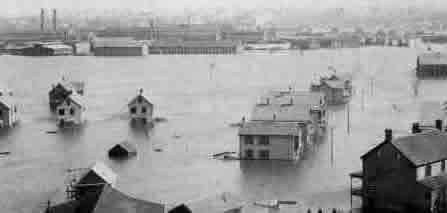
ICE JAMS AND FLOODING
Union College
| HOME |
| General Info |
| Flood History |
| Jams and Dams |
| Schoharie River |
| Collins Pond |
| Media Matters |
| History of Mohawk River Floods |
Floods have occurred on the Mohawk since its inception about 10,000 years ago. Here we are mainly interested in the history since settlement by the Dutch in the 1600’s. The historical record of flooding on the Mohawk River was constructed through detailed examination of newspaper accounts, and other historical documents. Flooding of the Mohawk River is associated with two main types, "Free water" flood events and "break-up" events. "Free-water" flood events commonly occur in late summer and early fall, during the peak of hurricane season and are associated with large amounts of precipitation. Break-up events are associated with the break-up of river ice, resulting from rising temperatures, melting snow, and heavy rains and commonly occur during winter and early spring. Break-up events are exacerbated by the formation of ice jams and account for the majority of the large-scale flooding events (< 15’). The worst flooding occurred in the late 1800’s and early 1900’s, where stages >15’ were reached eight different times in a span of 45 years. This time span concluded with the great flood of 1914, the most devastating event in recorded history. Since the 1914 event, there has been a decline in the frequency and magnitude of flooding in the Schenectady region. These are the web papers that we've completed to date:
|
This document can be located from http://minerva.union.edu/garverj/mohawk/
© Environmental Science and Policy Program, Union College, Schenectady N.Y. 12308-3107. All rights reserved. No part of the document can be copied and/or redistributed, electronically or otherwise, without written permission from the Director of the Environmental Studies Program, Union College, Schenectady NY, 12308-2311, USA.
|
||